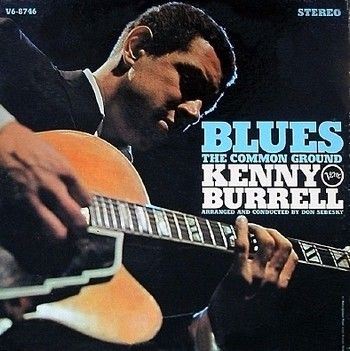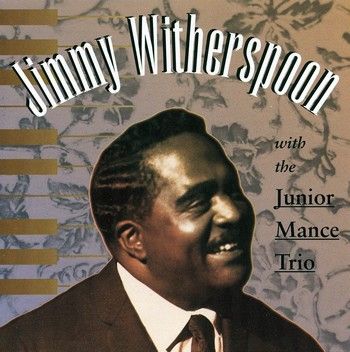
Kenny Burrell - Blues The Common Ground - 1968 - Verve Records
When it comes to Kenny Burrell, a title like Blues -- The Common Ground speaks volumes. His approach always keeps in mind the connection of jazz to the blues, infusing his guitar with a soulful, hard bop edge. Recorded in 1967 and 1968, Blues -- The Common Ground finds Burrell backed by lots of brass and wind instruments for most of the album, hardly his usual setting. But his guitar successfully weaves in and out of songs like "Every Day (I Have the Blues)" and "Burning Spear," blending with the band and creating a pleasant balance. Much of this works thanks to arranger Don Sebesky's tasteful settings. Sebesky seems to have an instinctive grasp of when to sit on the band and when to let it fly loose. There's the late-night, gentle feel of "Angel Eyes," and the more animated setup on the title cut. The only time this doesn't work is on pieces like "The Preacher" and "See See Rider," where the upbeat horns and shrill flutes remind one of a "groovy" soundtrack from a bad '60s movie. It's also interesting to note that the album's unusual song choices, like "Everydays" by Stephen Stills, do find common ground in the blues. There's a beautiful, short solo piece, "Were You There?," and two quartet pieces, "Sausalito Nights" and "Soulful Brothers." Blues -- The Common Ground holds up well, and the 2001 reissue offers Burrell fans a cleaned-up version of this fine album. © Ronnie D. Lankford, Jr. © 2011 Rovi Corporation. All Rights Reserved http://www.allmusic.com/album/blues-the-common-ground-r109165/review
The reissue of Kenny Burrell's 1968 Blues: The Common Ground on CD is most welcome, for it is one of the supremely dependable guitarist's finest albums. Backed for the most part by an all-star orchestra reveling in Don Sebesky's imaginative arrangements, Burrell fashions a series of outstanding performances as accessible as they are penetrating, thus fully bearing out the record's titular claim. Particular felicities include "Everydays", "Burning Spear," and the title track. Also here are two superb quartet cuts with Herbie Hancock, Ron Carter, and Grady Tate and an exquisite solo exploration of "Were You There?". No extra tracks or takes were discovered, but the album is richly rewarding from start to finish, its varied and durable pleasures belying the modest playing time. Now Verve should reissue the equally distinguished Night Song that Burrell made shortly afterward. © Richard Palmer © 1996-2011, Amazon.com, Inc. or its affiliates http://www.amazon.com/Blues-Common-Ground-Kenny-Burrell/dp/B00005N6SZ
Not "blues" like you might expect from the title – but a hip batch of tracks that has Kenny soloing over arrangements by Don Sebesky, playing in a warmly chromatic mode that's similar to the work that Wes Montgomery also cut with Sebesky. The tracks all have a nicely angular quality – Kenny taking care of the frontline solos with ease, and Sebesky letting the band fall behind him in broad washes of color, tone, and mood. Titles include "Sausalito Nights", "Were You There", "Burning Spear", "Angel Eyes", "The Preacher", and "The Common Ground". © 1996-2011, Dusty Groove America, Inc.
Not strictly a "blues" album. More in the jazz blues mould in the style of Wes Montgomery or the early George Benson. However, Kenny's brilliant guitar technique can't be faulted. He also has the help of world class musicians like Herbie Hancock on piano, Ron Carter on bass, and Snookie Young on trumpet. A timeless and stylish album and HR by A.O.O.F.C.Try and listen to Kenny's "Earthy" and "Pieces of Blue and the Blues" albums
TRACKS / COMPOSERS
A1 Everydays - Stephen Stills 3:15
A2 Every Day (I Have The Blues) - Peter "Memphis Slim" Chatman 3:14
A3 The Preacher - Horace Silver 2:54
A4 Angel Eyes - Earl Brent, Matt Dennis 4:59
A5 The Common Ground - Kenny Burrell, Warren Stephens 2:52
A6 Were You There - Trad. 1:07
B1 Burning Spear - Richard Evans 2:45
B2 Wonder Why - Music - Nikolaus Brodszky, Lyrics - Sammy Cahn 3:55
B3 Soulful Brothers - Kenny Burrell, Warren Stephens 5:31
B4 See See Rider - Gertrude "Ma" Rainey 3:25
B5 Sausalito Nights - Kenny Burrell, Warren Stephens 4:12
MUSICIANS
Drums - Donald MacDonald (tracks: A1, A2, B2, B4), Grady Tate (tracks: A3 to A5, B1, B3, B5)
Guitar - Kenny Burrell
Bass - Ron Carter
Piano - Herbie Hancock
Percussion - Johnny Pacheco
Trombone - Bill Watrous (tracks: A1, A2, B2, B4), Jimmy Cleveland, Paul Faulise (tracks: A1, A2, B2, B4), Tony Studd (tracks: A3 to A5, B1), Urbie Green (tracks: A3 to A5, B1). Wayne Andre
Trumpet - Bernie Glow (tracks: A1, A2, B2, B4), Ernie Royal (tracks: A3 to A5, B1), Snookie Young (tracks: A1, A2, B2, B4), Jimmy Nottingham (tracks: A3 to A5, B1), Jimmy Owens, (tracks: A1, A2, B2, B4), Thad Jones (tracks: A3 to A5, B1)
Tuba - Don Butterfield (tracks: A1, A2, B2, B4), Harvey Phillips (tracks: A3 to A5, B1)
Woodwind, Reeds - Jerome Richardson
Arranged By [Orchestra] - Don Sebesky
BIO
One of the leading exponents of straight-ahead jazz guitar, Kenny Burrell is a highly influential artist whose understated and melodic style, grounded in bebop and blues, made him in an in-demand sideman from the mid-'50s onward and a standard by which many jazz guitarists gauge themselves to this day. Born in Detroit in 1931, Burrell grew up in a musical family in which his mother played piano and sang in the Second Baptist Church choir and his father favored the banjo and ukulele. Burrell began playing guitar at age 12 and quickly fell under the influence of such artists as Charlie Christian, Django Reinhardt, Oscar Moore, T-Bone Walker, and Muddy Waters. Surrounded by the vibrant jazz and blues scene of Detroit, Burrell began to play gigs around town and counted among his friends and bandmates pianist Tommy Flanagan, saxophonists Pepper Adams and Yusef Lateef, drummer Elvin Jones, and others. In 1951, Burrell made his recording debut on a combo session that featured trumpeter Dizzy Gillespie as well as saxophonist John Coltrane, vibraphonist Milt Jackson, and bassist Percy Heath. Although his talent ranked among the best of the professional jazz players at the time, Burrell continued to study privately with renowned classical guitarist Joe Fava and enrolled in the music program at Wayne State University. Upon graduating in 1955 with a B.A. in music composition and theory, Burrell was hired for a six-month stint touring with pianist Oscar Peterson's trio. Then, in 1956, Burrell and Flanagan moved to New York City and immediately became two of the most sought-after sidemen in town, performing on gigs with such luminaries as singers Tony Bennett and Lena Horne, playing in Broadway pit orchestras, as well as recording with an array of legendary musicians including Coltrane, trumpeter Kenny Dorham, organist Jimmy Smith, vocalist Billie Holiday, and many others. Burrell made his recorded debut as a leader on the 1956 Blue Note session Introducing Kenny Burrell -- technically his second session for the label, but the first to see release. From the late '50s onward, Burrell continued to record by himself and with others, and has appeared on countless albums over the years including such notable albums as 1957's The Cats featuring Coltrane, 1963's Midnight Blue featuring saxophonist Stanley Turrentine, 1965's Guitar Forms with arrangements by Gil Evans, and 1968's Blues -- The Common Ground. Beginning in 1971, Burrell started leading various college seminars including the first regular course to be held in the United States on the music of composer, pianist, and bandleader Duke Ellington. He continued performing, recording, and teaching throughout the '80s and '90s, releasing several albums including 1989's Guiding Spirit, 1991's Sunup to Sundown, 1994's Collaboration with pianist LaMont Johnson, 1995's Primal Blue, and 1998's church music-inspired Love Is the Answer. In 2001, Burrell released the relaxed quartet date A Lucky So and So on Concord and followed it up in 2003 with Blue Muse. He celebrated turning 75 years old in 2006 by recording a live date, released a year later as 75th Birthday Bash Live! In 2010, Burrell released another live album, Be Yourself: Live at Dizzy's Club Coca-Cola, recorded at Lincoln Center's smaller club-like venue. Besides continuing to perform, Burrell is the founder and director of the Jazz Studies Program at UCLA as well as President Emeritus of the Jazz Heritage Foundation. © Matt Collar © 2011 Rovi Corporation. All Rights Reserved http://www.allmusic.com/artist/kenny-burrell-p61114/biography





